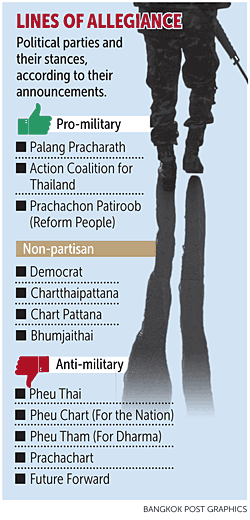
The Democrat Party has a chance to form a coalition government led by pro-regime parties rather than cooperating with Pheu Thai as the opposition, political analysts say.
On Monday, the party kicked off its leadership contest with incumbent leader Abhisit Vejjajiva and two other candidates formally announcing their intention to vie for the top post.
Mr Abhisit insisted that the party under his leadership would not support dictatorship and said if the party were to form a coalition government, its partners must have shared values.

Deputy Democrat leader Nipit Intarasombat explained that Mr Abhisit's stance is that he will not support a dictatorship of any kind, be it a military or parliamentary one -- a situation where one political party controls parliament so completely it can do whatever it wants.
Instead, Mr Abhisit will focus on pursuing policies aimed at addressing the economy and bread-and-butter issues closer to people's everyday lives, Mr Nipit said.
Mr Nipit brushed aside talk that the party may eventually lean toward supporting a military dictatorship, saying any form of dictatorship is detrimental to democracy.
However, the party's stance has been challenged by academics.
Somjai Phagaphasvivat, a political scientist at Thammasat University, said that even if Mr Abhisit gets re-elected as party leader, it remains unclear whether he can maintain his stance against dictatorship.
Mr Somjai said Mr Abhisit is known as a champion of democracy and is free of conflicts of interest.
With his stance against a military dictatorship as manifested by the National Council for Peace and Order (NCPO), and a parliamentary dictatorship as allegedly practiced by the Pheu Thai Party-led government in the past, Mr Abhisit will find himself in a politically difficult position and the party will face internal conflict as a result of its members wanting to be part of a coalition government, Mr Somjai said.
Jade Donavanik, chairman of the Faculty of Law College of Asian Scholars, shared the view, saying the Democrat Party will be able to maintain its anti-dictatorship stance only if it becomes a core part of a coalition. But this will be tough for the Democrat Party, compared to Pheu Thai, Mr Jade said.
He said that Pheu Thai, and its previous incarnations such as the now-defunct Thai Rak Thai, had never won less than 200 House seats in previous elections.
Even for the next general election expected in late February, it has been estimated that Pheu Thai, in a worst-case scenario, would get at least 150 seats, Mr Jade said.
But for the Democrat Party, there is no knowing how many House seats the party will get, and there is a possibility that it may even get less seats than Pheu Thai, Mr Jade said.
But if Mr Abhisit wants to maintain his stance against dictatorship after the poll, the Democrat Party may have to be on the opposition benches, Mr Jade said.
But if the country's oldest party ends up aligning with pro-regime parties to form a coalition, a way to minimise damage to its reputation is for the party to vouch for a prime minister chosen from a list of three prime ministerial candidates proposed by a political party, rather than an unelected or "outsider" premier, Mr Jade said.
An outsider premier is a term referred to a person who is not on political parties' lists of nominated candidates.
Under the constitution, if MPs fail to select a new premier from parties' lists of nominated candidates, a provisional clause under Section 272 would trigger an alternative route.
In such a situation, senators could join MPs in proposing a motion to suspend the rule requiring that prime ministerial candidates come from party lists, paving the way for an outsider prime minister to be selected.
Meanwhile, a group of pro-election activists have transformed themselves into a network called Free, Fair, and Fruitful Election.
Anusorn Unno, a core leader of the group, said the network brings together more than 10 civic groups to campaign for free and fair elections. It includes the anti-regime People Who Want Elections group.
The group's activities will begin on Sunday at Thammasat University's Tha Phrachan campus and run until the general election, said Mr Anusorn, also a core leader of the Thai Academic Network for Civil Rights and dean of Thammasat University's Faculty of Sociology and Anthropology.
Mr Jade said such it was not usual for such groups to make an appearance ahead of an election.
- See also: EC threatens Pheu Thai dissolution